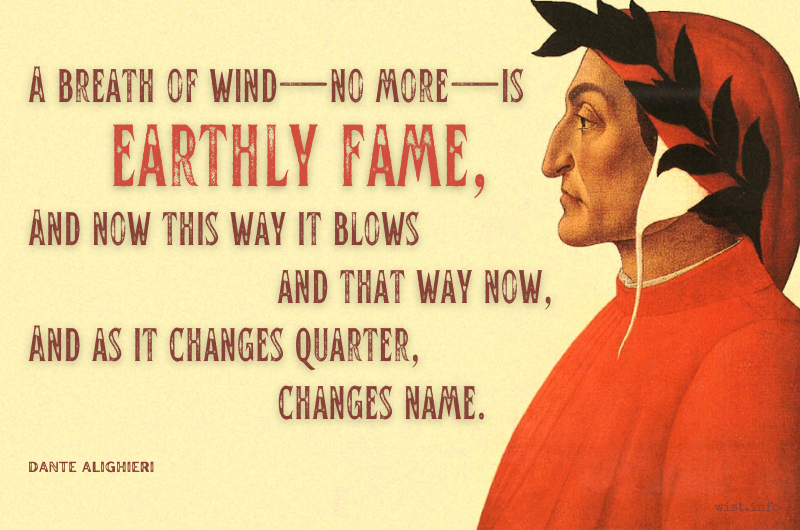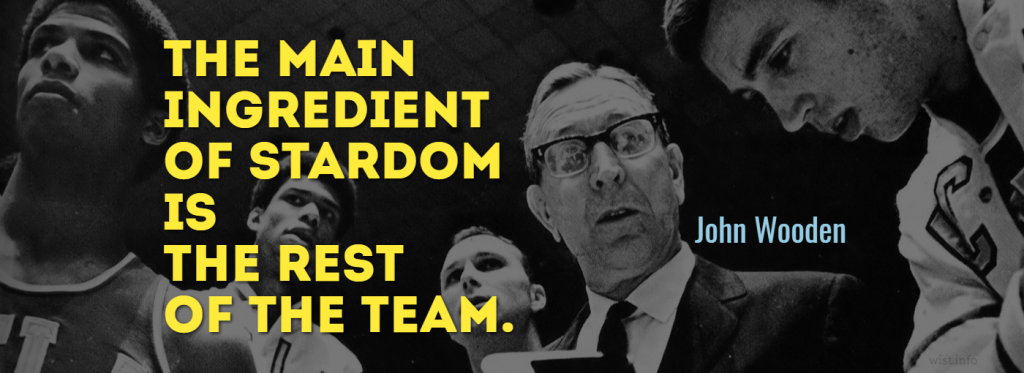A breath of wind — no more — is earthly fame,
And now this way it blows and that way now,
And as it changes quarter, changes name.
[Non è il mondan romore altro ch’un fiato
di vento, ch’or vien quinci e or vien quindi,
e muta nome perché muta lato.]Dante Alighieri (1265-1321) Italian poet
The Divine Comedy [Divina Commedia], Book 2 “Purgatorio,” Canto 11, l. 100ff (11.100-102) [Oderisi of Gubbio] (1314) [tr. Sayers (1955)]
(Source)
(Source (Italian)). Alternate translations:
The breath of Fame is but a fickle gale,
Whose veering blasts from every point prevail,
And every change bestows a different name.
[tr. Boyd (1802), st. 20]
The noise
Of worldly fame is but a blast of wind,
That blows from divers points, and shifts its name
Shifting the point it blows from.
[tr. Cary (1814)]
The mundane rumour is a fleeting breath
Of wind, that veers and varies in account,
And changes name because it changes point.
[tr. Bannerman (1850)]
Naught is this mundane rumour but a breath
Of wind, that comes now this way and now that,
And changes name, because it changes side.
[tr. Longfellow (1867)]
The rumour of the world is naught else than a breath of wind, which now comes hence and now comes thence, and changes name because it changes quarter.
[tr. Butler (1885)]
Mundane renown is but a breath forlorn
Of wind that cometh now from here, now there,
Named various from the quarter whence 'tis borne.
[tr. Minchin (1885)]
Worldly renown is naught but a breath of wind, which now comes this way and now comes that, and changes name because it changes quarter.
[tr. Norton (1892)]
Earthly fame is naught but a breath of wind, which now cometh hence and now thence, and changes name because it changes direction.
[tr. Okey (1901)]
The world's noise is but a breath of wind which comes now this way and now that and changes name because it changes quarter.
[tr. Sinclair (1939)]
Naught but a wind's breath is the world's acclaim,
Which blows now hence, now thence, as it may hap,
And when it changes quarter changes name.
[tr. Binyon (1943)]
A breath of wind is all there is to fame
here upon earth: it blows this way and that
and when it changes quarter it changes name.
[tr. Ciardi (1961)]
Earthly fame is naught but a breath of wind,
which now comes hence and now comes thence,
changing its name because it changes quarter.
[tr. Singleton (1973)]
Your earthly fame is but a gust of wind
that blows about, shifting this way and that,
and as it changes quarter, changes name.
[tr. Musa (1981)]
Earthly fame is nothing but a breath of wind,
Which first blows one way and then blows another,
And brings a fresh name from each fresh direction.
[tr. Sisson (1981)]
Worldly renown is nothing other than
a breath of wind that blows now here, now there,
and changes name when it has changed its course.
[tr. Mandelbaum (1982)]
The clamor of the world is nothing but a breath of wind that comes now from here and now from there, and changes names because it changes directions.
[tr. Durling (2003)]
Worldly Fame is nothing but a breath of wind, that now blows here, and now there, and changes name as it changes direction.
[tr. Kline (2002)]
The roar of earthly fame is just a breath
of wind, blowing from here and then from there,
that changes name in changing origin.
[tr. Kirkpatrick (2007)]
Worldly fame is nothing but a gust of wind,
first blowing from one quarter, then another,
changing name with every new direction.
[tr. Hollander/Hollander (2007)]
Shouts of worldly fame are nothing more
Than a passing breath of wind, blowing here,
Then there, changing its name from place to place.
[tr. Raffel (2010)]
Quotations about:
stardom
Note not all quotations have been tagged, so Search may find additional quotes on this topic.
What happens when conspiracy theories become the coin of politics, and mainstream media and educational institutions are discredited, is that citizens no longer have a common reality that can serve as background for democratic deliberation. In such a situation, citizens have no choice but to look for markers to follow other than truth or reliability. What happens in such cases, as we see across the world, is that citizens look to politics for tribal identifications, for addressing personal grievances, and for entertainment. When news becomes sports, the strongman achieves a certain measure of popularity. Fascist politics transforms the news from a conduit of information and reasoned debate into a spectacle with the strongman as the star.
Jason Stanley (b. 1969) American philosopher, epistemologist, academic
How Fascism Works: The Politics of Us and Them, ch. 4 (2018)
(Source)
Being a star has made it possible for me to get insulted in places where the average Negro could never hope to go and get insulted.
Sammy Davis, Jr. (1925-1990) American singer, dancer, actor, comedian
Yes I Can, Part 3, ch. 3 (1965)
(Source)
The main ingredient of stardom is the rest of the team.
John Wooden (1910-2010) American basketball player and coach
They Call Me Coach, ch. 25, epigraph (1972)
(Source)






